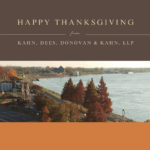by G. Michael Schopmeyer, Patrick C. Thomas, and Andrew D. Wurdeman
The Indiana Supreme Court reversed the Court of Appeals in an opinion issued on February 11, 2025. In the opinion, Calvary Temple Church of Evansville, Inc., v. Kirsch, the Court held that the “premises liability exemption,” as statutorily enacted in a 2005, was expansive and applied to the Church’s entire parcel of land where the Appellee, Kirsch, was injured.

The Appellee, Kirsch, a Calvary Temple Trustee, was working on a storage barn at the Church’s parking lot when he fell and was injured. Kirsch sued his Church under several theories of negligence. The Church moved for summary judgment based on said statutory premises liability exemption for religious organizations (IC § 34-31-7-2), because Kirsch was on “premises owned, operated, or controlled by [a] nonprofit religious organization and used primarily for worship services.”
The key question before the Court was whether the word “premises” under Indiana’s liability exemption statute should be defined as the whole parcel of land, or just the smaller portion where worship services took place. The Supreme Court interpreted the term using its plain meaning and looked to “general-language dictionaries” for guidance. Those dictionary definitions established that “premises” broadly referred to whole parcel of real estate. Because the Supreme Court found that “premises” had a plain and ordinary meaning, it held there was no ambiguity and that Kirsch’s proposed alternative interpretation was not reasonable.
The Court’s decision clarified that nonprofit religious organizations enjoy expanded protections on their premises. This case helps churches, synagogues and mosques understand the scope of liabilities they are protected against. If you have questions about premises liability or how you can protect your religious organization, call Mike Schopmeyer, Patrick Thomas, Andrew Wurdeman, or any of our other experienced legal professionals.






